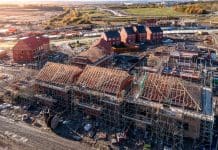The Glenigan index for August shows a modest rise in construction starts, particularly in residential construction
Glenigan have published their construction start index for August, and it details a moderate uptick in construction starts as the new government reviews its plans.
The construction index shows that residential construction starts had the biggest rise with 12%.
The rise is due to the change in the political landscape
The index shows that, although ‘starts-on-site’ were still down from 2023 by 11%, the last three months have had a 2% increase.
The past few years have been tough on the construction industry, and this index marks the first rise in many months.
Much of this can be attributed to Labour’s focus on housebuilding, and having established their majority government, have started reviewing construction projects as well as starting new ones.
In the last three months, most of the regions in the index experienced a rise, with Northern Ireland and the East Midlands seeing the biggest rise with 39% and 33%, respectively.
The Glenigan index shows residential sector saw the biggest rise in construction starts
In the preceding three months from the report, the residential sector saw a 12% rise, especially due to a spike in private housing starts, which rose by 25%. However, social housing remained down.
The non-residential sector was also generally slow, but education, hotels & leisure, and civils all either maintained their position or grew moderately.
Allan Wilen, Glenigan’s economic director said:
“The industry should be buoyed by these results, a clear sign confidence is starting to return to the market. This is evidenced by the spike in private housing starts, a longstanding barometer of investor conviction and consumer appetite. Developers will no doubt see plenty of opportunity as this vertical continues to thaw over the next six months, hopefully having a positive, knock-on effect for other, associated built environment assets.
“Social housing and non-residential sectors have remained relatively subdued, yet this is unsurprising. After all, the timing of planned projects has been disrupted by the general election and the new Government’s commencement of a wide-sweeping review of programmes. For example, the uptick in Civils should be taken as short-lived, especially in light of this week’s announcement to pause and scale back road and rail projects.”














